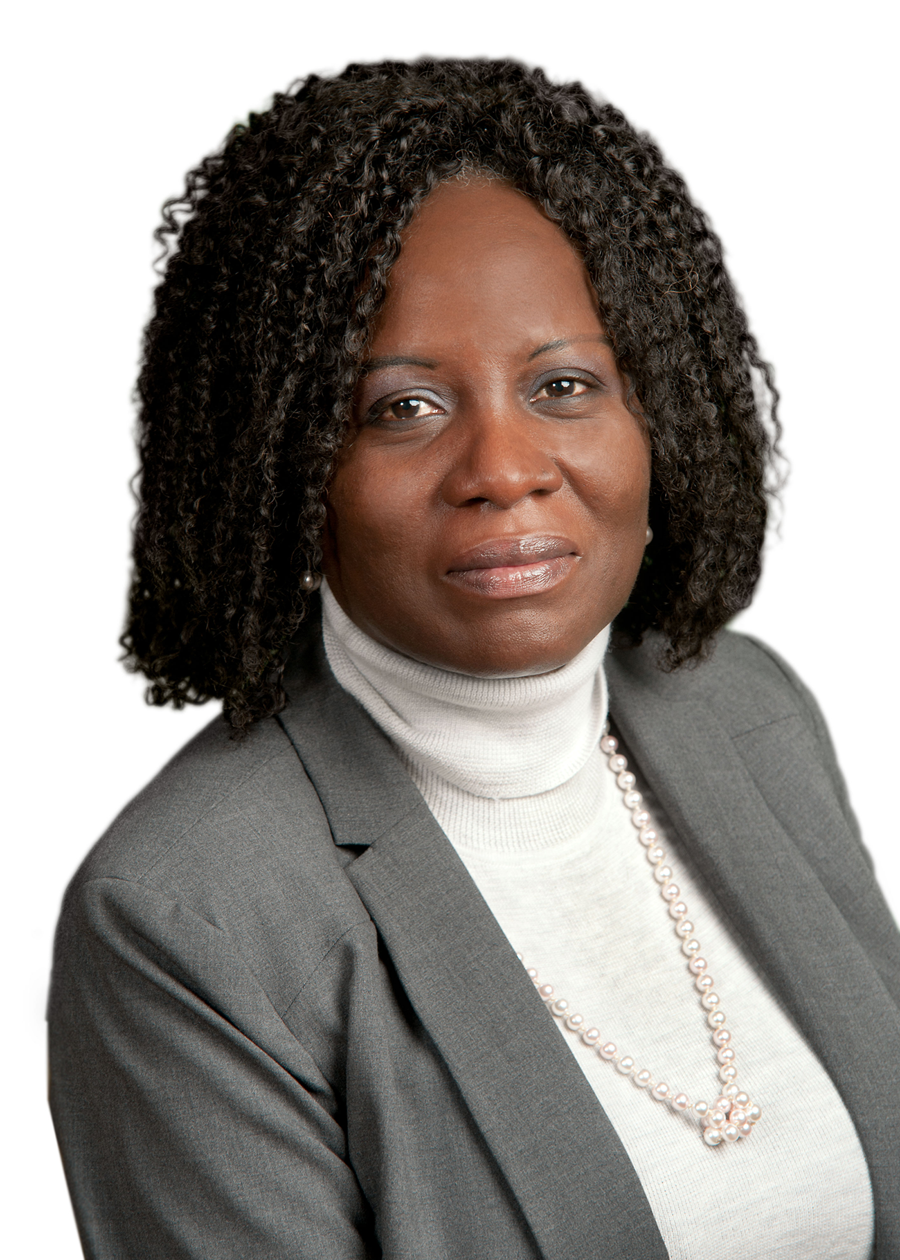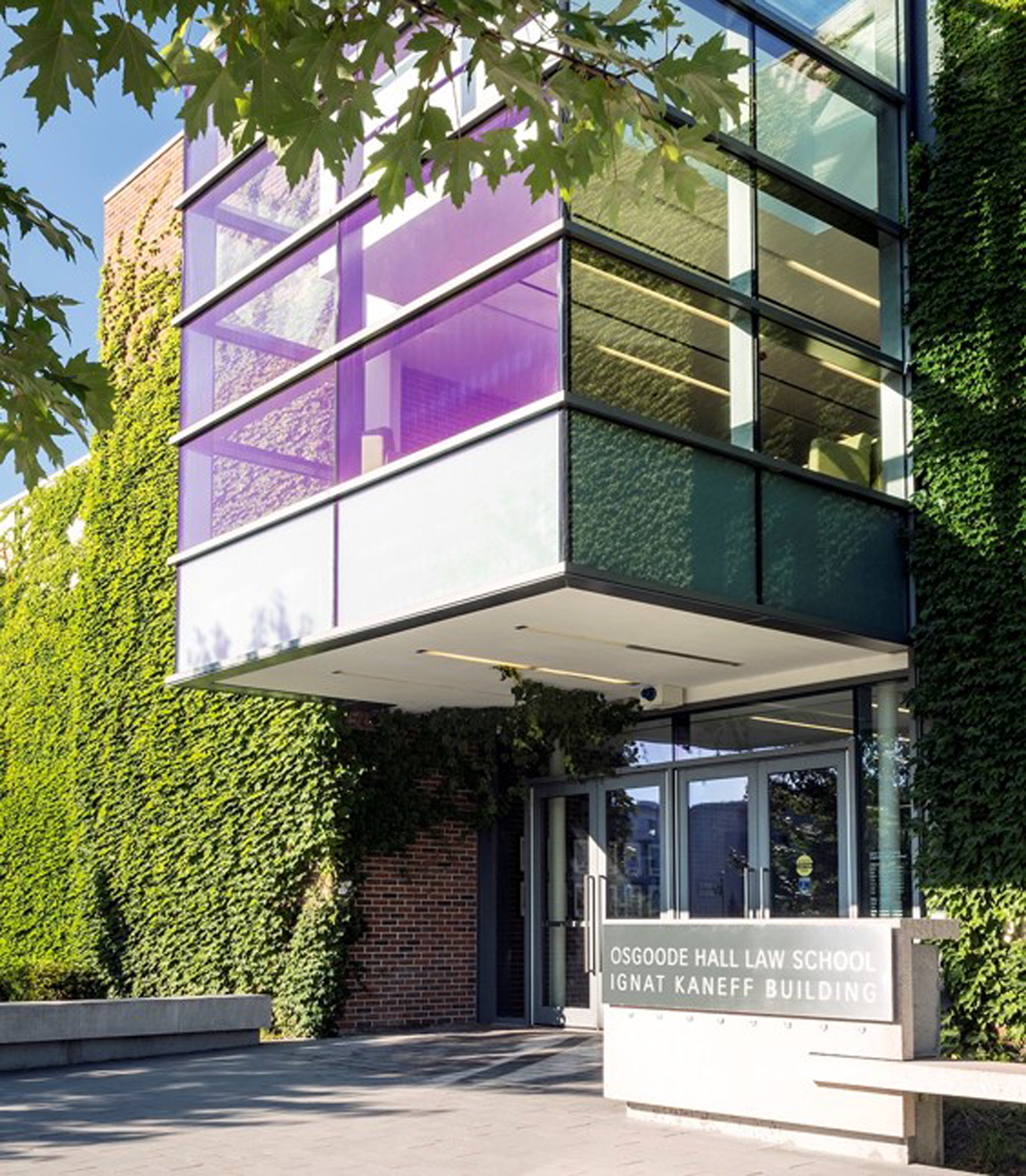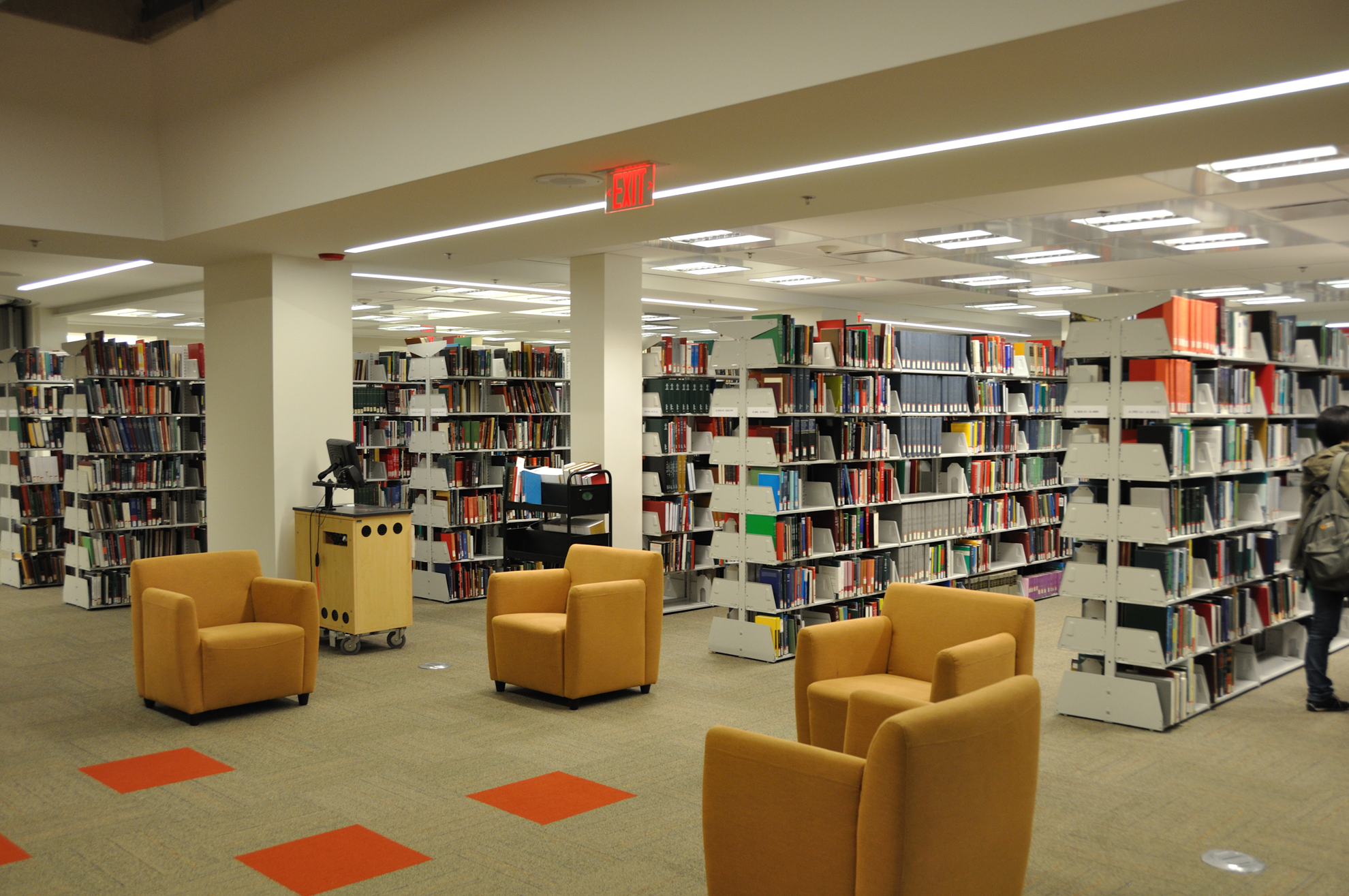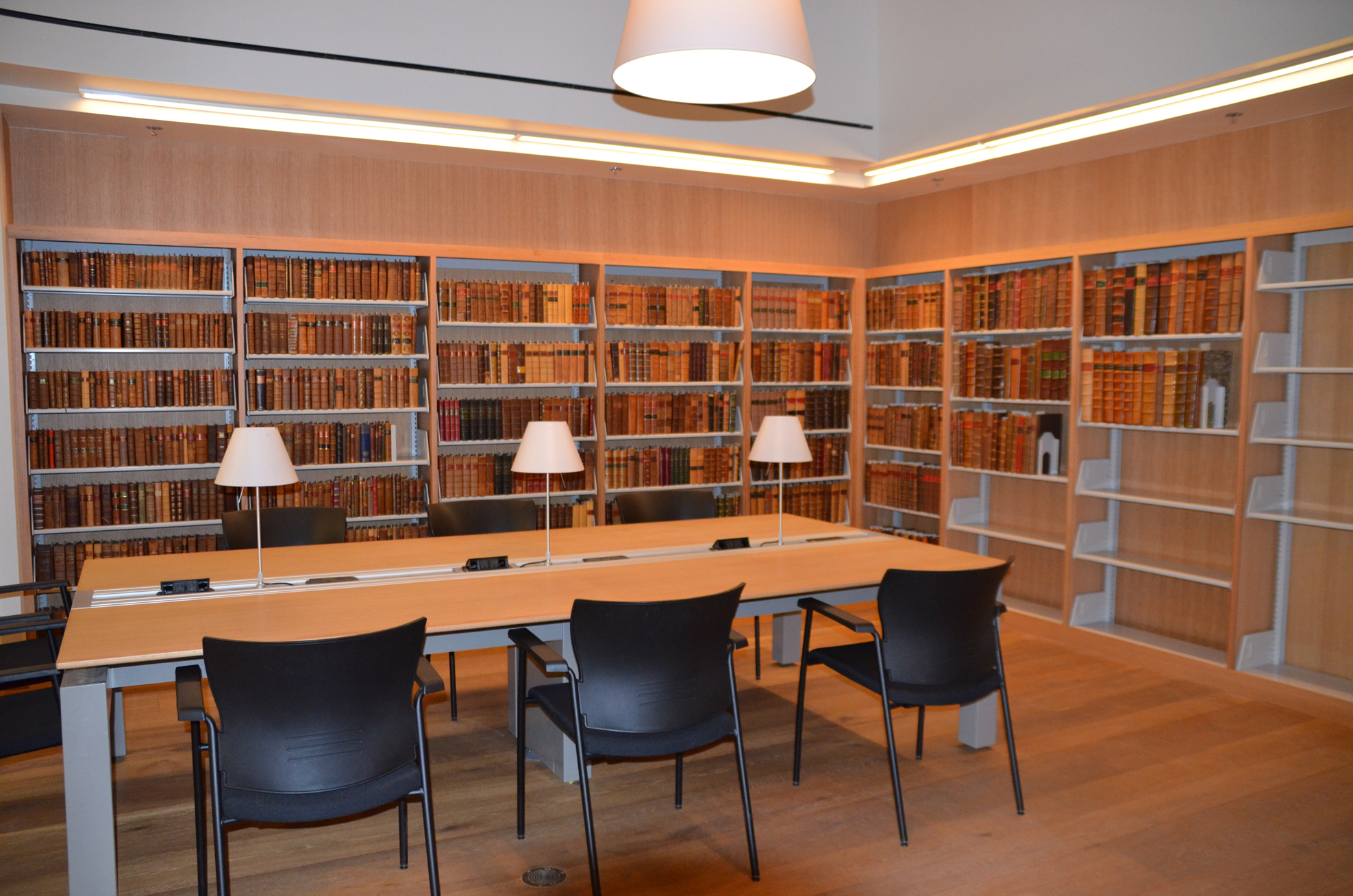
Yemisi Dina is the President of CALL/ACBD and the chief law librarian at the Osgoode Hall Law School at York University in Toronto
When you think of the plus-points of being a librarian, working in locations all around the world is rarely towards the top of the list. The work, particularly in the legal sector, can be specialised and law librarians tend to stay in the same country, and usually the same city, for the entirety of their careers. Yemisi Dina, the President of CALL/ACBD, the Canadian Association of Law Libraries/Association Canadienne des Bibliothèques de Droit, is an exception to the rule, however, having studied and worked in London, Nigeria, The Bahamas and now Canada, where she is chief law librarian at the Osgoode Hall Law School, at York University in Toronto.
Yemisi's career has been, to say the least, interesting then. Yet it was very much a matter of serendipity that she became a librarian in the first place. “I think it was just meant to be,” she says. “I got married and I joined my husband in England, and he decided to move back to Nigeria,” which is Yemisi's home country. “I had gone to law school to study law, but I didn't really practise. So, when we got back to Nigeria, I was looking for something to do, and it just happened that the University of Ibadan was looking for someone with a law background to run their library. Why somebody with a law background? Because they were moving to a subject specialist approach for their libraries. And then they had to comply with the accrediting body's requirements, because in Nigeria, the Council of Legal Education, which is responsible for accrediting law programmes, requires that a law librarian must have an LLB. I was at the right place at the right time, and I was offered the position, but the condition was that I had to go back to do a Master's in library science. So that's how I became a law librarian.”
This was in 1996, and by 2001 Yemisi had moved on to a job at Nigeria's Council of Legal Education. “It's the Nigerian Law School, which is where graduates, when they finish their LLB, go for the practical training,” she says. “It's for solicitor and advocate training.”
MOVING TO THE CARIBBEAN
Quite soon, however, the chance to work in another part of the world came along, and Yemisi was quick to grasp it. “It was an opportunity,” she says. “I saw this ad’ in The Times Higher Education Supplement, about the law programme in the University of the West Indies setting up something in the College of The Bahamas in Nassau. So I applied. I had a telephone interview with them and that's how I got a position. I had to move to The Bahamas in July 2001. So, that was a very interesting year, because it was moving my entire life, with three young kids. It was a very interesting experience. It was challenging, but it was good. I had a lot of support from both institutions. I had to start their collection. They started building it, but I was hired for that purpose, because I had a common law background. The legal system of The Bahamas is similar to Nigeria and many Commonwealth countries, because of the common law similarities. So that's one of the reasons why I was hired.
“It was a small library, but it was a lot of work, building something from scratch to support research and teaching. But it was good. It was a learning experience,” Yemisi adds. “And something about me, when I get into something, I like to put my best into it. I guess that's maybe because of the way I was brought up.”
Because she had lived in England and worked in Nigeria Yemisi says dealing with the culture in The Bahamas was not an issue for her. “The Bahamas is multicultural as well, so that was very helpful.” she says. “And the students were great. Many of them were mature students. There were just a few who were undergraduates. And the faculty members, as well, came from different parts of the world; people came from Singapore, some from the Caribbean, some from Nigeria as well. So that was also very interesting.

The Law School building at York University
“I did two contracts in The Bahamas, and by that time I had helped them to grow their collections. And things were changing, things were emerging. There were different databases coming up, and so I helped them to manage all the subscriptions, did the website and so many things; trained some of their staff as well. So, that was The Bahamas. And then by that time, it was time to move on to something else.”

Soft seating area in the Osgoode Hall library
Which meant another country. “We decided to emigrate to Canada,” says Yemisi. “So that too was new; the weather was different from The Bahamas, but we adapted. People kept asking, ‘why did you leave the warm weather to come to a cold environment?’ In the first year I started off at the public library, I also had a brief stint at the ministry of Attorney General, in Canada. I just did an admin role there, which was good, very helpful to help me out, in understanding how the system works.
“But I guess I'm always at the right place at the right time, and they were looking for a librarian at the Law Library at York University in my second year [in Canada].” This was initially a post as associate law librarian and she became chief law librarian at Osgoode Hall in 2019. “I didn't really have to learn too much, because the legal system in Canada is also Commonwealth and common law. I just assimilated into the role, and while there were some learning curves, they were not very sharp or wide. So that has been my career so far and I've been enjoying myself.”
The word enjoy came up many times during our interview, and this is because Yemisi has taken great pleasure from her work as a law librarian, right from the very beginning. “I enjoy helping people to find information, no matter how difficult the process can be,” she says. “I don't easily give up, especially when I know that the students, and the faculty members, need those materials for their research and teaching. And then I also enjoy learning about legal systems and information about different countries. That's something I've been exposed to with my job. Also, meeting people, meeting professionals, lawyers, judges, professors, librarians from different parts of the world. And I've been able to collaborate with them on different projects. So, I really enjoy that a lot, too. It's been a wonderful experience for me. I've grown a lot, in so many ways, so I enjoy doing those things … Sharing knowledge, sharing skills. I really enjoy that.”
Yemisi's current role as chief librarian means she does not get quite the same interaction, though. “Because I'm in management now, I miss sitting at the reference desk,” she says. “I miss that a lot, because that's where you get to know the students, they just unwind and tell you so many things. So I miss that part of it, because I'm now kind of siloed into my office.”
THE CALL OF CALL
All that said, Yemisi still very much enjoys – there's that word again – her work at York, which she says is both stimulating and rewarding. But this has not stopped her taking on another challenge, that of being President of CALL/ACBD, the Canadian Association of Law Libraries/Association Canadienne des Bibliothèques de Droit, a move which she says has already proved beneficial to her. “It's really helping me,” says Yemisi. “Meeting people from different provinces and different backgrounds, different sectors. There are people from the law firms, and I've never worked in a law firm. People who work in government departments, and I've never been exposed to that kind of work environment either.”
But that's not to say she was unprepared for the role. “I've stepped into the presidential position now, but I've had a two-year preparation where I've been Vice President One and Vice President Two,” Yemisi says. “So that has prepared me for this position as President; learning about the association, learning about the governance and the structure.”
Of course, being the President of an organisation of the stature of CALL is not without its challenges, chief amongst which for Yemisi right now is the membership numbers, which at the time of writing were just over 300. “The biggest challenge is retaining members, and the declining membership,” Yemisi says. “As in many associations, we are still recovering from the pandemic. The pandemic took three years from everybody. Some people lost their jobs, people got demotivated. We were stuck doing things online, virtually. I'm stepping into the role as President, trying to bring people together, in person. So that's very challenging. It involves a lot of effort, bringing in new things, new ideas, and trying to motivate people. Also, some people have lost their jobs and they're no longer in the sector, and some have moved to different sectors, so they're no longer law librarians. The membership rate keeps declining, and I have to really work on that, retaining the members and bringing people together and finding ways to motivate them.”
In BIALL there is a similar issue, which is also partly due to an aging workforce which is in the process of retiring. Yemisi says there's more to it than this, though. “The challenge is the employers. Are they replacing these people? Are they replacing those positions? That's one of the challenges we have in Canada. So, for example, in the academic sector, the academic libraries, they are moving to a functional approach. They are merging different roles together and removing the position of law librarians. In some places you don't have law librarians anymore. So that takes away from the association, because the institution may not necessarily support them to come and join. CALL doesn't have an institutional membership, we only have personal members. So the university may think, why am I paying for you as a law librarian, because you are responsible for business science and law is just 2% of your role, so why would I pay for that? That's a major challenge.”
Another issue is the paucity of volunteers, something else that's also affecting BIALL. “Yes, we have a similar issue,” Yemisi says. “Especially during the pandemic, people were just not motivated. Some committees just kind of died and things went quiet. But now people have started coming back and we're encouraging them. Every now and then we put calls into the newsletter that goes out every month, and we're seeing some results from that. But it's been really tough.”
There are, however, signs that things are on the up as far as volunteers are concerned. “I think they're coming back,” says Yemisi. “We had our first [after the pandemic] in person conference in May, and the sense I had was that people were eager to come back, and some people were putting their names forward for different committees. People have also been helpful. They've been identifying other people who have certain skills for the different groups who they think will be able to assist. And that has been working.”
LEARNING CURVE
Despite the challenges, Yemisi is thriving as President, and she is particularly enjoying the interaction that comes with this role. “I've been meeting different colleagues and getting to know them and what they're contributing to the association, the many volunteers that we have,” she says. “Before I became a part of the executive board, I just attended the conferences, I collaborated with some people, but I wasn't really interested in the small detail of running the association, understanding the governance process of CALL activity, the budgeting, attending and conducting meetings, making decisions, working with the management company that runs the association. So, those are the things I'm enjoying. I'm learning about that process.”
She also has a long list of things she would like to achieve during her term as President, which comes to an end in the summer of 2025, and she has high hopes for the future of CALL. “In five years, I would like to see an increase in the number of members,” Yemisi says “That's one of my main goals. And I would also like its financial position to be very stable and buoyant. And then I would like to see my colleagues having grown a lot in whatever they're doing, having contributed a lot, maybe in terms of volunteering, building their networks and whatever committees they have volunteered for, and having made changes, made an impact. CALL is also introducing a five-year strategic plan, which we are going to be launching later in the fall.”
Meanwhile, part of Yemisi's own plan is about reaching out, even beyond Canada. “One of the major things that I've highlighted is I want to network, build the network as much as possible, and recruit as many members for the association as possible, especially from international colleagues. And then locally as well, I'm going to be reaching out. We're going to reach out to as many organisations and bodies as possible, and collaborate with them as well, to highlight the benefits of being a member of CALL.”
To this end Yemisi is keen to forge stronger links with BIALL. “I want to organise as many webinars as possible on different topics,” she says. “That's something I would like to collaborate on with BIALL and other sister associations.

Inside the John R Cartwright Rare Book Room at the Osgoode Law Library
“With BIALL, I am thinking of maybe working with the webinar committee that we have at CALL and making suggestions on how we can collaborate on webinars, on different topical issues that relate to both jurisdictions,” Yemisi adds. “And we can invite speakers from both associations to talk about things that we have in common in both legal systems. And then also contributing to the journals, and presenting at the conferences, at the annual conferences; encouraging members of both associations to present at both conferences.”
GLOBAL CHALLENGES
It's surely right that bodies such as BIALL and CALL should cooperate, after all they face many of the same challenges. One of these, for instance – and this was touched upon earlier yet bears repetition – is the reluctance of some employers to fill roles that have been made vacant. “I think one of the main issues facing the profession across the world is, I would say, the employers,” says Yemisi. “When people retire, they are not replacing those positions. So that's one of the major challenges across the sectors. In academic settings, more than likely, you have to really fight. If a tenured librarian retires, the institution may say they just want a part-time librarian. It's the same with some law firms, they just want a smaller role. Maybe if a manager retires, they may just want somebody who is a coordinator, not necessarily a manager, and in some government departments as well. So that's one major challenge. I don't know how people are going to overcome that, because you can't challenge your employer with it, unless maybe it's a unionised environment and the union takes it up.
“Another challenge is, they're just not giving the library a major role,” Yemisi adds. “They don't see the library as a necessity anymore. I've been in meetings where the financial officer tells me ‘everything is online, why do we need this many people in the library?’ And I challenge that. It's not true. Not everything is online. We still have some things that are exclusively in print.”
Taking that a step further, Yemisi is also worried about how some even seem to see the library as irrelevant today. “The library, to me, is the heart of any institution, whether it's in the law firm, whether it's in the government department, or in the academic setting,” she argues. “The library is very, very important and needs to be developed, not just with collections, but with the people who run the place as well. So that's the challenge that I think everybody's facing all over the world, even in the US.”
POSITIVE OUTLOOK
Yemisi has faced many such challenges during her career, of course, yet she is, on the whole, upbeat about where the profession is, and she is particularly pleased with advancements on diversity and inclusion in recent times, especially in Canada. “I think in Canada, in college libraries, they are trying hard,” she says. “When I joined 17 years ago, there was no Diversity, Inclusion and Decolonisation Committee, but that was created six, or seven years ago. And they're doing a lot of work, because in Canada there are different layers to diversity. There's a decolonisation with the Indigenous and Aboriginal community. So there's that, and then there is the Black, and then there's the orientation, like LGBTQ+.
“When I joined, there wasn't this much emphasis, there wasn't much discussion, it wasn't something that was talked about,” Yemisi adds. “But now there's actually a committee that is responsible for that. I think we've made a lot of progress, and I think it's the same across all other Canadian associations as well. And then in the US, because I'm a member of AALL, there's that prominence of people coming out and talking about it. There are webinars, there are committees, there are so many events addressing so many things now.”
As to the future of the profession itself, she is optimistic. “I think I see a very good picture,” Yemisi says. “I see a picture of people adapting to the many challenges and developments, especially with respect to technology. When I joined librarianship way back in Nigeria, that was when we were talking about automation. And I saw the fear amongst my colleagues then, especially the older ones. It was ‘the computer is going to take away my job, they're going to replace me with the computer’. They were fearful and they expressed a lot of anxiety. And then when I moved to the Caribbean I also saw this kind of reaction from younger people joining the profession. They would say things like, ‘why would I need to even go back to school and learn anything? After all, they're going to replace me with the system that you guys are trying to build’. And I would say: ‘I don't think that's the case. I think you should just embrace technology and see what you can learn and what you can do’. And I think that's still the future of the profession.
“I think that the future lies in people being open, adapting and be willing to learn,” Yemisi adds. “And I think that's what I have always done. I've embraced so many challenges and tried to learn and develop myself. And I think that's what people should do. We should develop ourselves. We should embrace all the changes. So artificial intelligence, all these tools, we have to teach our users how they can make sense of what it is that those things are trying to do. They are not taking over their lives. I think we have a lot to learn. But I think that's the future of the profession … It is very exciting. Some people are very negative about it, but I'm actually very positive.”




